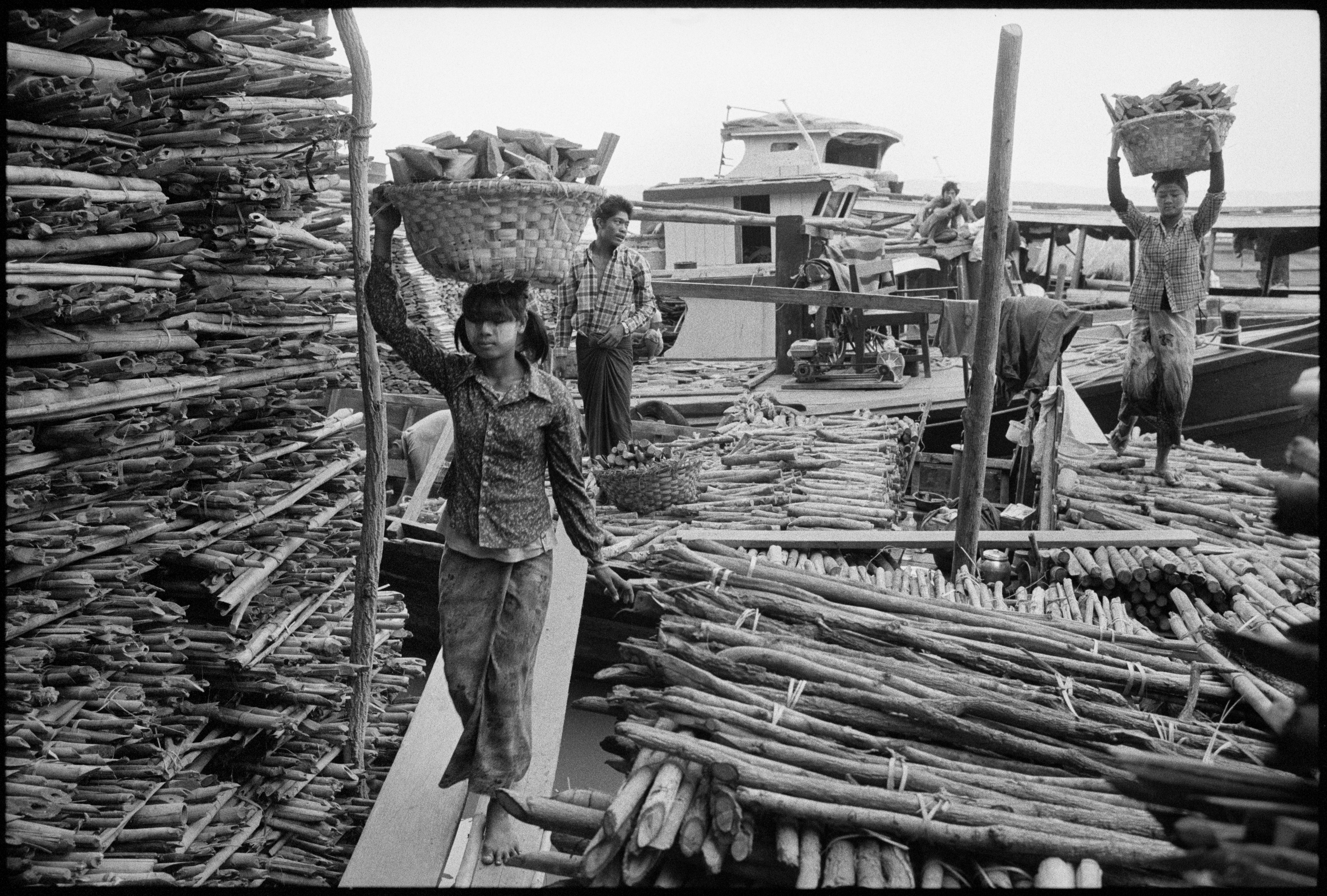Reporting from Myanmar’s Irrawaddy Delta through different sets of eyes
Young women dock workers unload firewood from ferries on the Irrawaddy River in Mandalay.
BOGALAY, Myanmar — Last week a group of Open Hands Initiative-GlobalPost reporting fellows left Yangon and set out for the Delta — low-lying wetlands in the Irrawaddy Region that at one time served as the ‘rice bowl’ for the rest of Southeast Asia. Cyclone Nargis devastated the area in 2008: over 150,000 people are estimated to have been killed and the vast majority of farmland — the area’s livelihood — was destroyed. Our group is reporting on how the area is recovering five years later.
SARAH FITZPATRICK: For me, this trip was an adventure, a chance to see a part of Burma that foreigners rarely see. But Ei Ei saw things differently.
EI EI TOE LWIN: I’ve been to this area several times, and at the beginning this trip felt like just another day at work.
SARAH: We quickly discovered that almost getting anywhere in the Delta required a boat. Monday morning we set out for walked through the mangrove forest and into a small cluster of thatched-roof buildings that make up Pay Chaung village. I had never visited a place quite like this before, and I was excited to see a radically different way of life with its own rhythms and traditions. I asked about everything: how many people lived in the village? (270 people in 80 households, most homes consisting of one or two rooms)
What happens when someone gets sick? (A government doctor visits the monastery across the river 3 days a week, but villagers must travel more than an hour away to the nearest hospital for more substantial care) Is it normal that after serving lunch the hosts stand around the table fanning their guests while they eat? (Apparently yes, I’m told it’s a Burmese tradition).
Beyond the excitement of being in a place that was totally unfamiliar, this trip has been a lesson in the importance of ‘ground truth.' My focus is on public health and access to healthcare, and my research prior to the trip lead me to expect a dire situation in rural areas of Myanmar: in 2008 the country had the second highest rate of child mortality in Asia, today it is fourth. Preventable diseases such as TB, malaria and diarrhea are widespread and often fatal. But what I’ve come across in my reporting this week has suggested that there has been a marked improvement in public health since Nargis, a change that many local healthcare workers attribute to the work of foreign non-governmental organizations.
Developments include increased access to free government healthcare, a growing private healthcare sector and village clinics with particular attention to vaccinations and prenatal care. The current issues are proximity and access to advanced treatment as well as broader health education. For example, one village nurse told me that she was able to provide the necessary antibiotics, but villagers would often not finish the entire dose and relapse as a result.
EI EI: I’ve previously made two reporting trips to the Delta, but this is my first trip with foreign friends as part of this fellowship. It's an area that is rich in natural resources, but even prior to Cyclone Nargis the region was significantly behind the rest of Burma by most development standards. The last time I visited Bogalay was a year ago, and I was expected to find the same changes that I’ve experienced in Yangon over the past year: more hotels, more internet access and reliable electricity. But Bogalay’s infrastructure is still extremely basic. We couldn’t find a source of internet to file our stories, and a lack of electricity during the day may be the reason why. This lack of basic infrastructure makes it hard to believe that the local economy will improve anytime soon.
After spending two days in the villages near Bogalay, I witnessed some encouraging changes. Now that farmers can sell their rice on the open market, they can command higher prices and therefore higher incomes. Villagers have gained more awareness of how to grow and nurture their rice harvests.
Post-Nargis, many national and international non-governmental organizations are collaborating with the local village communities, the growth of knowledge, skills and awareness is remarkable. But the health and education sectors remained underdeveloped. Many villages still need schools and clinics. For many living in the rural Delta region, it appears that the rebuilding continues.
